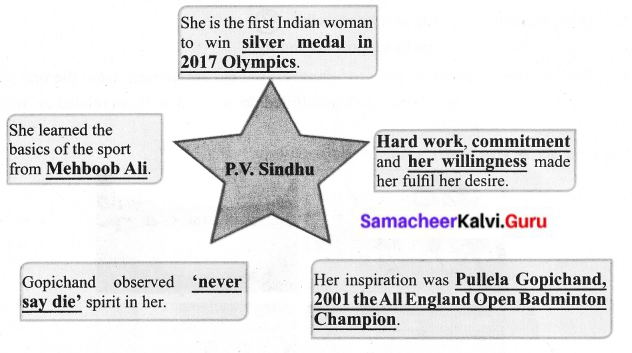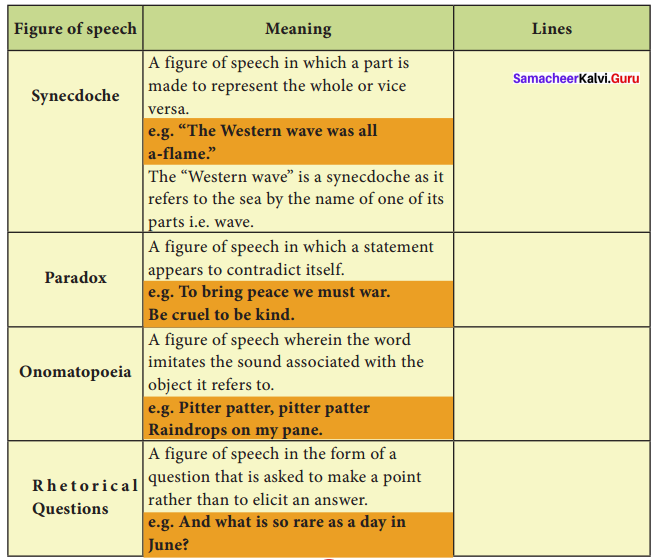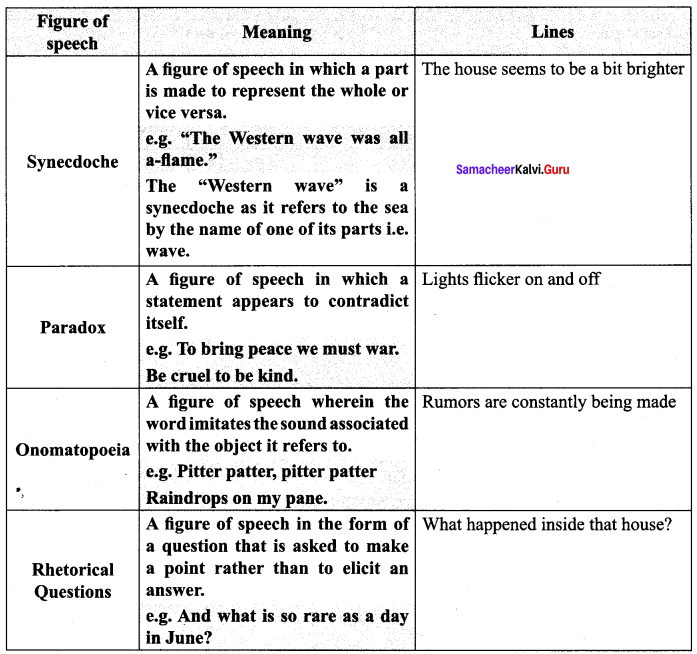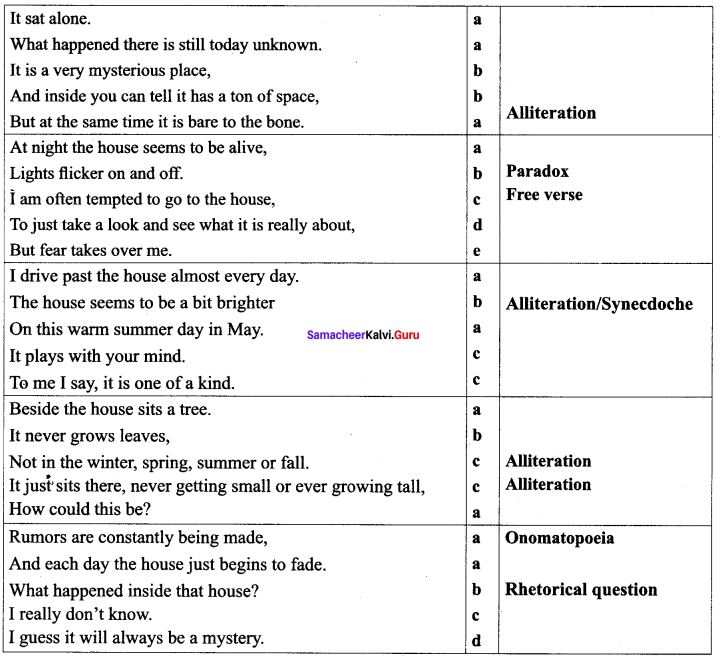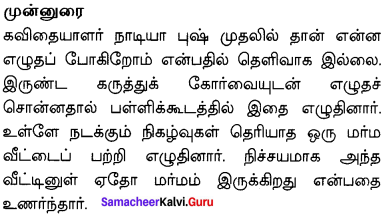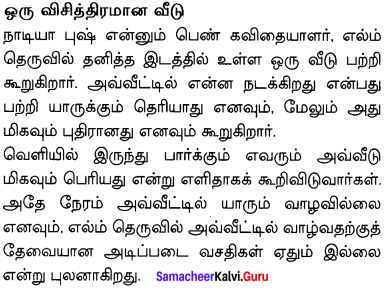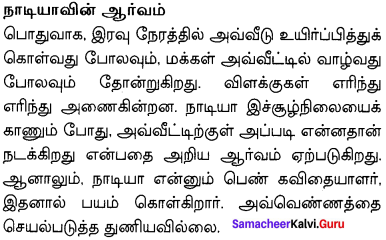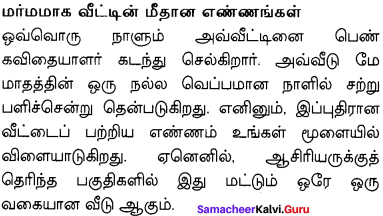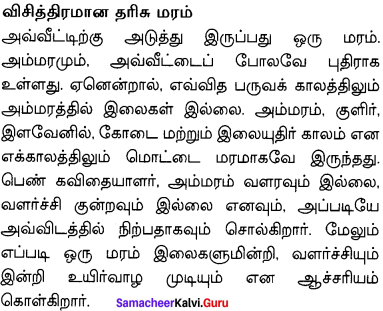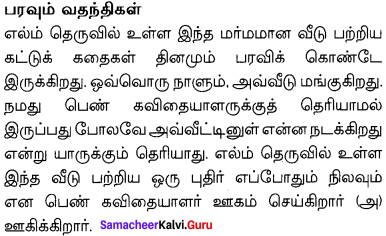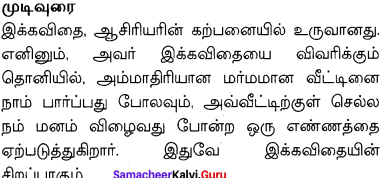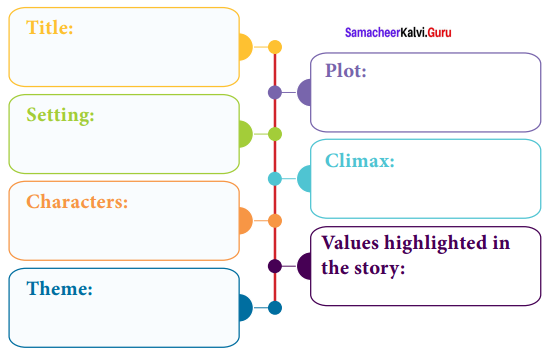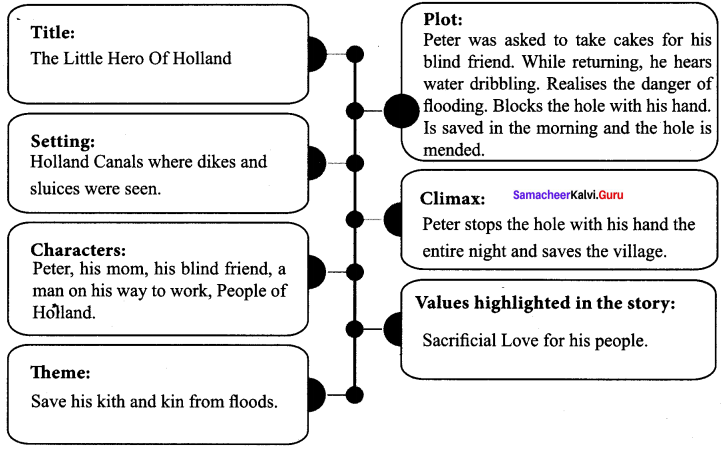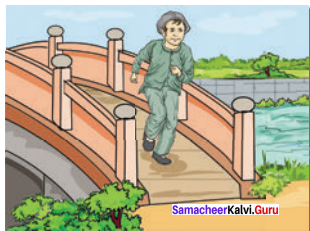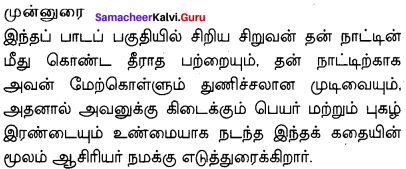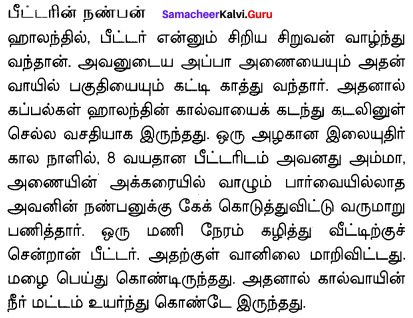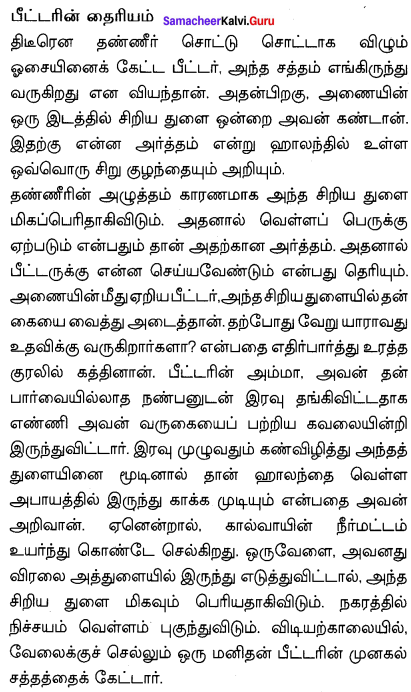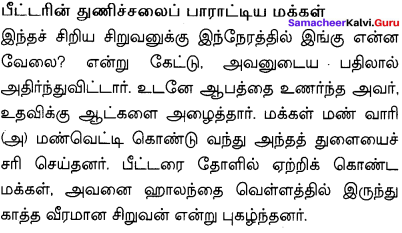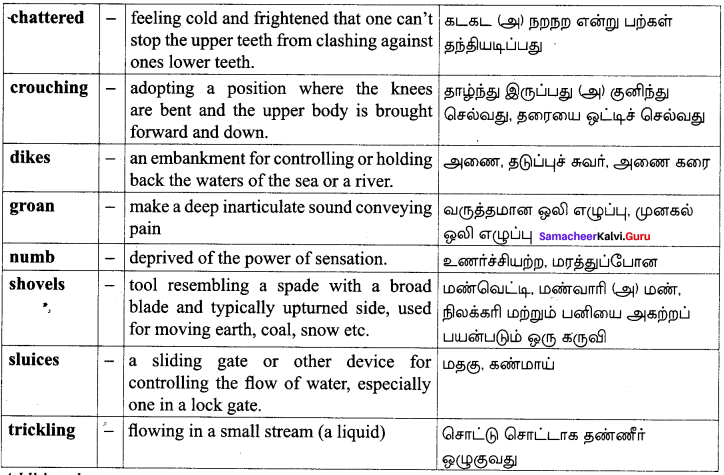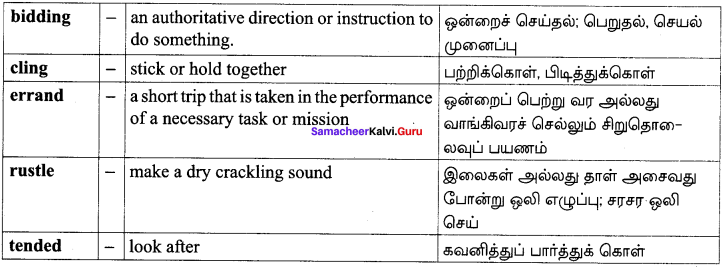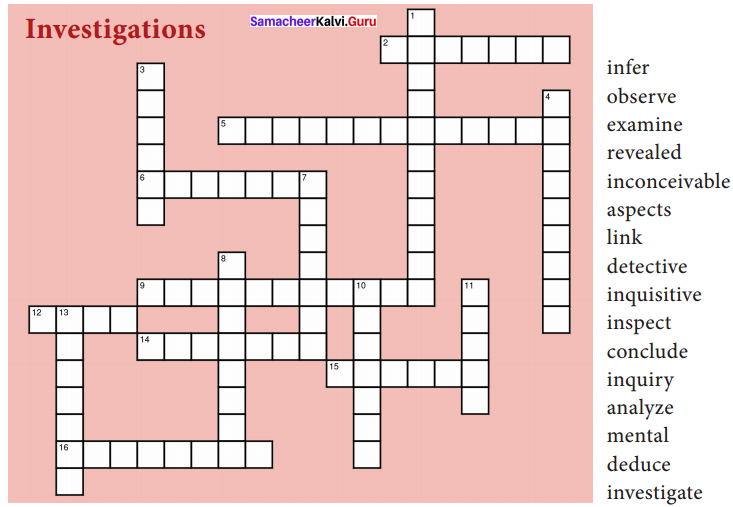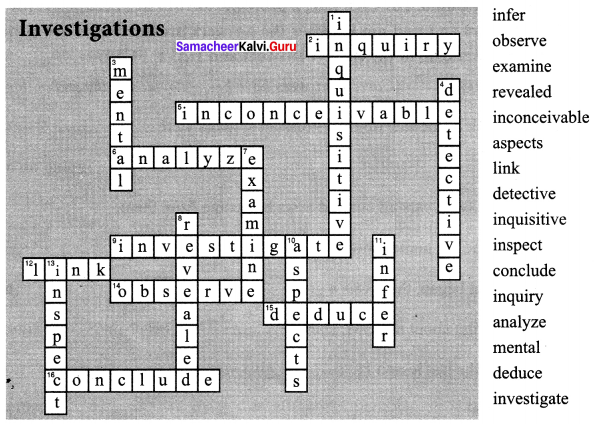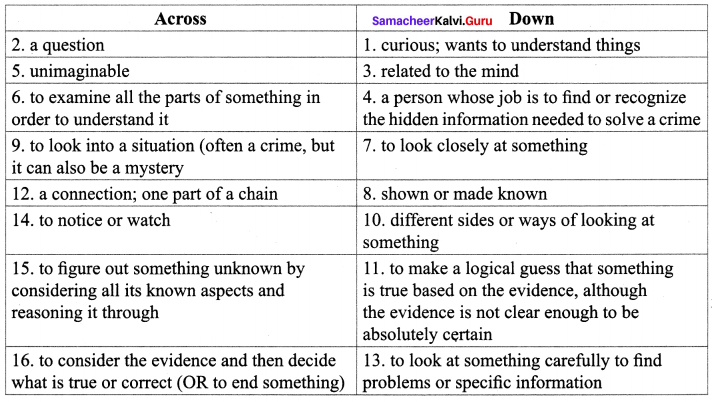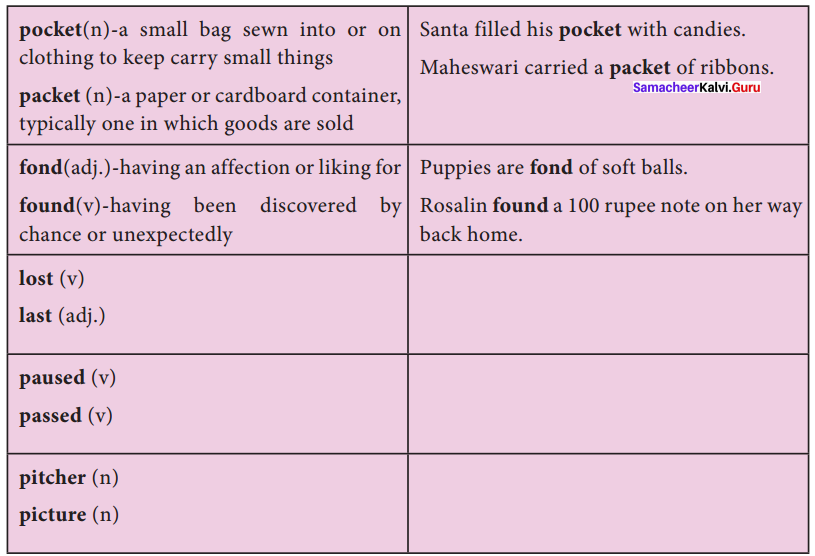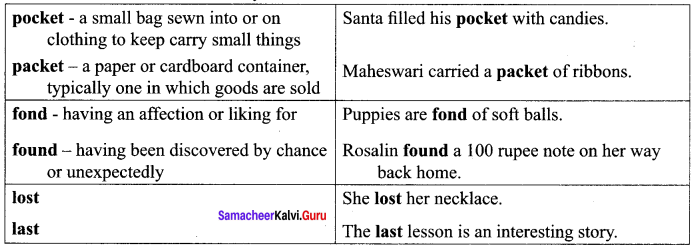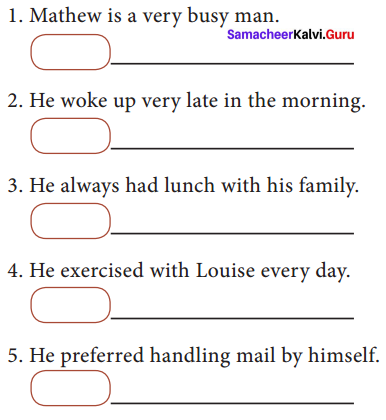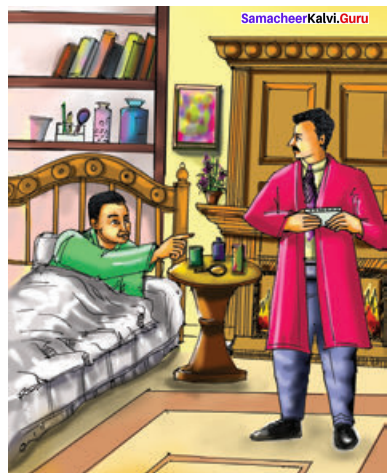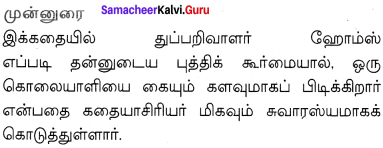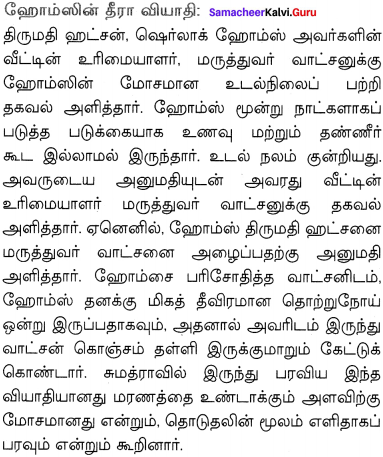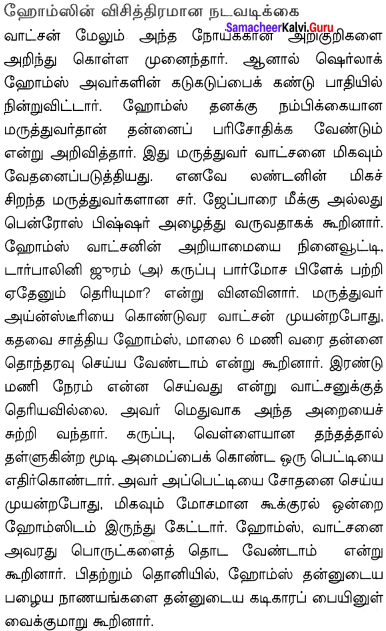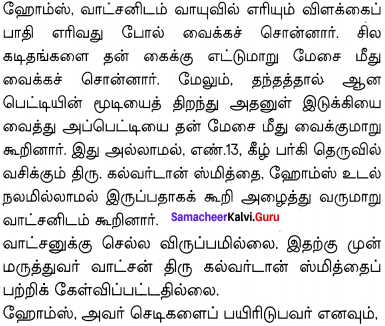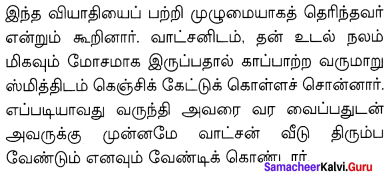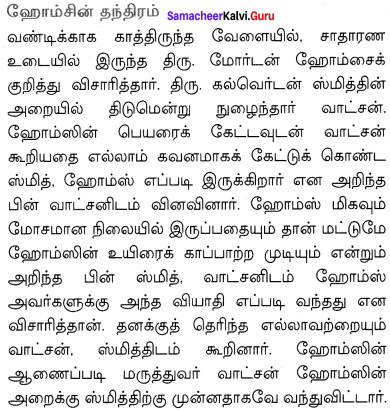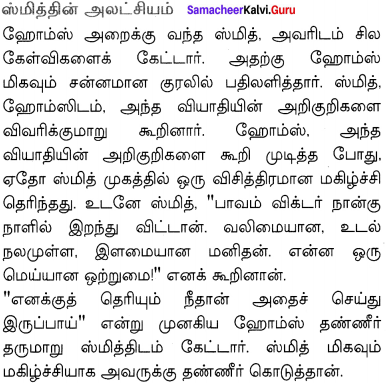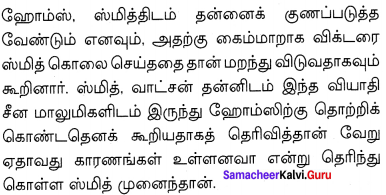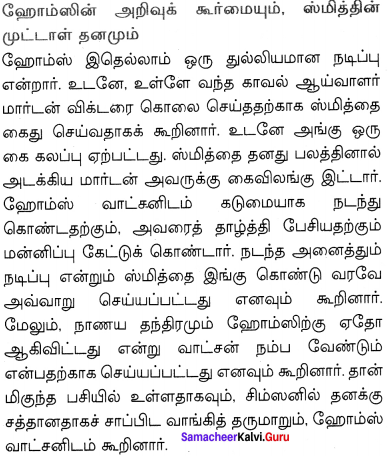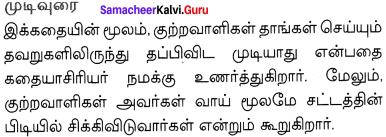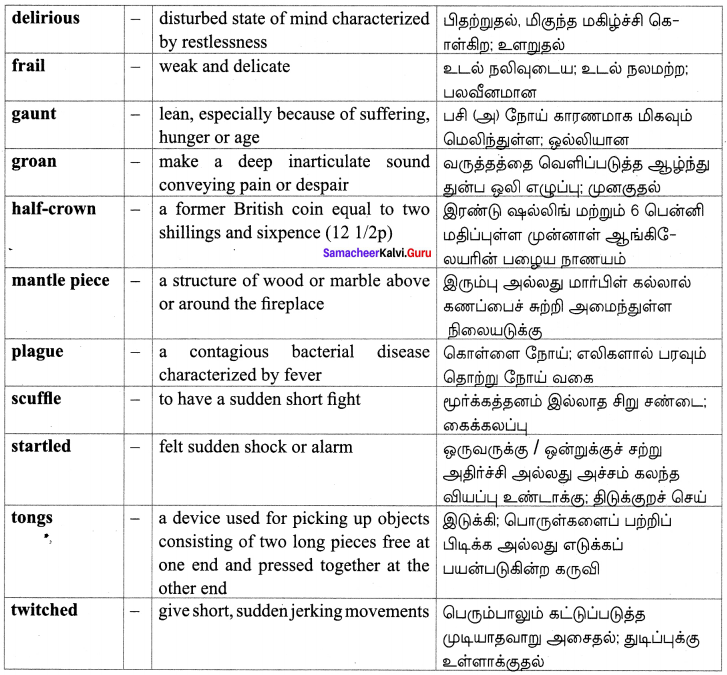Students can Download English Lesson 1 Sports Stars Questions and Answers, Summary, Activity, Notes, Samacheer Kalvi 6th English Book Solutions Guide Pdf helps you to revise the complete Tamilnadu State Board New Syllabus and score more marks in your examinations.
Tamilnadu Samacheer Kalvi 6th English Solutions Term 2 Prose Chapter 1 Sports Stars
Read and Understand
I. Identify the sports and the sports personalities from the lesson and fill in the table.
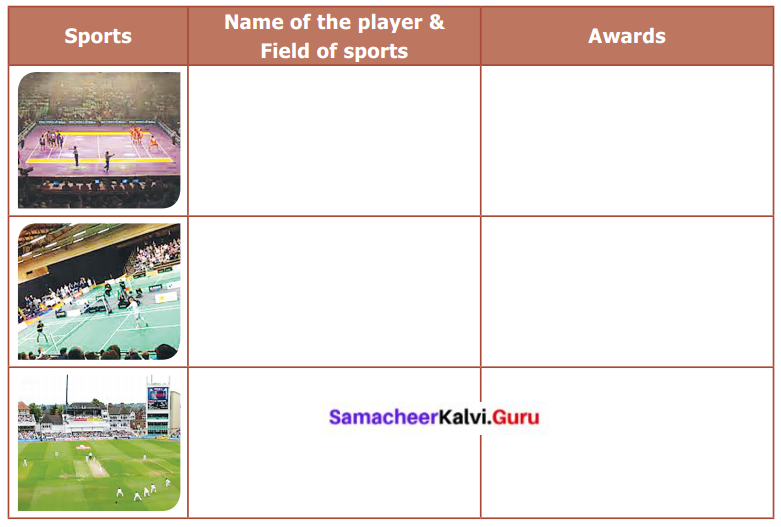
Answer:
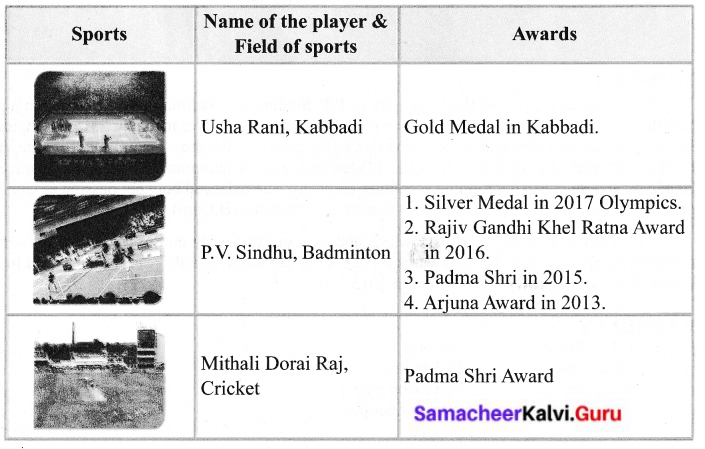
II. Read the questions related to the three sports stars you have read about and tick the appropriate boxes.
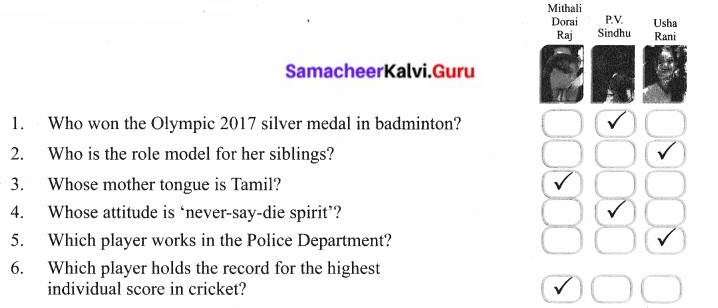
III. Think and answer.
Sports Stars 6th English Question 1.
Women/ Men can achieve anything, provided they put their heart and soul into it. Discuss in the class. Do you think being a man or a woman makes a difference?
Answer:
In this world of competition, everyone can achieve success, if they put their heart and soul into their task. Every person who achieves success in life, has to work hard with dedication and determination. It’s no matter, whether they are men or women. That makes no difference. All that matters is only hard work, determination and the willingness to achieve something big. One can always leam something from another person’s story. Each one of us should believe in ourselves and follow our passion to win with devotion and dedication. Success will surely embrace us one day.
Sports Stars 6th English Questions And Answers Question 2.
How can you balance your academic goals and your passion for sports or arts?
Answer:
A person’s determination and readiness to cross the obstacles in life, can make him / her to balance his / her academic goals and the passion for sports or arts. P.V. Sindhu is a good example for this. Despite being busy with her training schedules and International tournaments, she managed to attend regular school until class 9, after which all her classes were through correspondence. She did balance both her passion as well as her academics and she holds a Bachelor’s degree in Commerce (B.Com.). The other sports stars who balanced their passion for sports and academics are Rahul Dravid, Anil Kumble, V.V.S. Laxman, K. Srikkanth, M.S. Dhoni, Murali Vijay and Suresh Raina. All these stars excelled in Cricket. There are also others, who have excelled in the field of sports and academics. Therefore, the determination to surpass both in academics and sports and the ability in balancing both are the prime factors to achieve success in both the fields.
Vocabulary
A. Match the sport and the equipment.
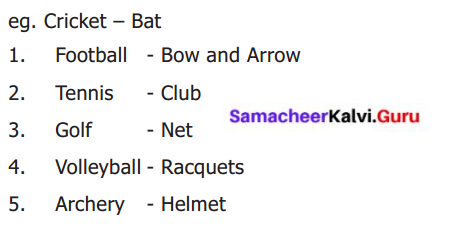
Answer:
- (v)
- (iv)
- (ii)
- (iii)
- (i)
B. Find the names of twelve sports and games from the grid.
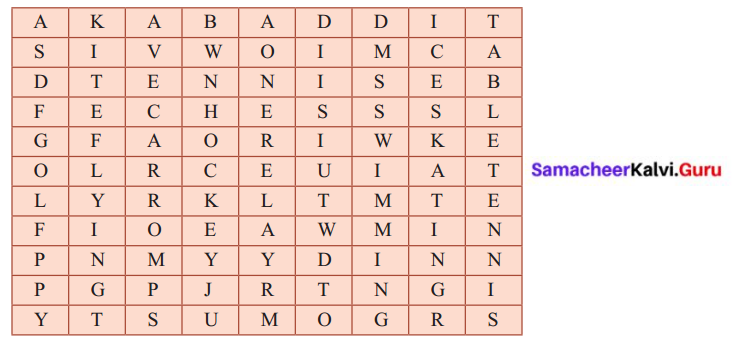
Answer:
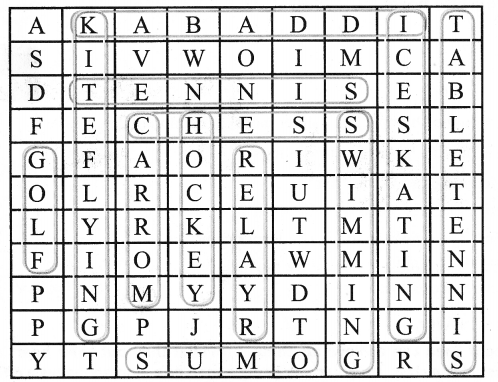
C. Tide the meaning of the italicised word.
Sports Star Lesson In 6th Standard Question 1.
Being compared to Sachin is an absolute privilege.
(a) Honour
(b) Right
(c) Favour
(d) Disadvantage
Answer:
(a) Honour
Chapter 1 Sports Stars Question 2.
The boy was taken by surprise when he learnt about Mithali Dorai Raj.
(a) Affected
(b) Moved
(c) Amazed
(d) Upset
Answer:
(c) Amazed
Sports Stars 6th English Book Back Answers Question 3.
Usha Rani had to struggle all through her life.
(a) Fight
(b) Duel
(c) Fun
(d) Work hard
Answer:
(d) Work hard
6th Standard English Sports Stars Question 4.
Usha Rani is expert at giving leads.
(a) Clumsy
(b) Sharp
(c) Skilled
(d) Bad
Answer:
(c) Skilled
Sports Star 6th Standard Summary Question 5.
No opponent is too big to defeat.
(a) Competitor
(b) Rival
(c) Helper
(d) Enemy
Answer:
(a) Competitor
D. Fit in the blanks with the opposites of the words given in brockets.
- We should learn from our _______ (success).
- Children don’t like to read _______ (interesting) books.
- Be _______ (general) when you’are telling us what you need.
- The teacher asked the children to _______ (start) talking.
- The new boss decided to _______ (appoint) the lazy workers.
Answers:
- failure
- uninteresting
- specific
- stop
- dismiss
Listening
E. Listen to your teacher and number the pictures accordingly.

Answer:

Write ‘T’ if the statement is True and ‘F’ if the statement is False.
- Himachal Pradesh is an ideal place for paragliding.
- Skiing offers opportunities to delve into oceans.
- Paragliding is also a recreational adventure sport.
- Scuba Diving has a huge following all over the world.
- The most suitable period for Skiing is from March to June.
Answers:
- True
- False
- True
- False
- False
Speaking
F. Look at these images of different kinds of sports. Identify and name as many as you can with your partner.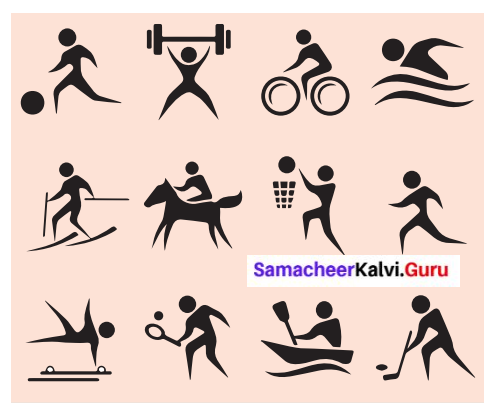
Answers:
- Football
- Weight Lifting
- Cycling
- Swimming
- Skiing
- Horse Riding
- Basket Ball
- Running
- Gymnastics
- Tennis
- Boat race
- Hockey
Describe any one of them to four partner.
Sports Stars 6th English Summary Question 1.
Name of the sport.
Answer:
Cricket
I love to play cricket with my friends. I often watch cricket matches with my father and my brother.
Sports Stars 6th English In Tamil Question 2.
What equipment is used to play the sport?
Answer:
The equipments used for this sport are pads, chest guard, elbow guard, helmet, abdominal guard, gloves, cricket bat and cricket ball.
6th Standard Sports Star Question 3.
What kind of area/ground/field it is played in?
Answer:
It is played on a field, where there is a rectangular 22-yard long pitch.
6th English Sports Stars Question 4.
How is it played?
Answer:
It is played between two teams of eleven players. Each team attempts to score runs, while the other team will defend by fielding. I enjoy playing this game whenever I get free time.
- I like to play cricket.
- I play cricket regularly with my friends.
- Cricket is an outdoor game.
- This game requires eleven players.
- The cricket sport has a bat, ball, leg pads, chest guards, elbow guards, gloves and , an abdominal guard.
- It is generally played in a ground.
- I enjoy playing this game
Grammar
G. Look sat the picture awl fill in the foiante with suitable words.
- There is a play ground in my school.

- The starry sky looks beautiful at night.

- The tray has fresh vegetables.

- It is a hot day.

- The girl gave her friend a pleasant smile.

H. Put the words in correct order and rewrite each sentence.
Samacheer Kalvi Guru 6th English Question 1.
They have a post-box. (Red, Small, Rectangular)
Answer:
They have a small rectangular red post-box.
6th Standard Sports Stars Question 2.
I have sticks. (Long, Two, Brown)
Answer:
I have two long brown sticks.
6th Standard English Sports Stars Book Back Answers Question 3.
Find me the brushes. (New, Five, Yellow)
Answer:
Find me five new yellow brushes.
Question 4.
Mahesh is a boy. (Thin, Tall, Clever)
Answer::
Mahesh is a tell thin clever boy.
Question 5.
It is a plate. (Round, Pink, Small)
Answer:
It is a small round pink plate.
I. Refer to a dictionary for the meanings and circle the odd one.
Answer:

Writing
J.
Question 1.
Imagine that you are the School Pupil Leader, Write a formal letter inviting the chief,guest for the school’s Annual Day. Give details of the time and place of the event.
Answer:
From
Ravi Teja, School Pupil Leader,
R. R. K. Hr. Sec. School,
No. 610, Ram Ngar,
Villivakkam, Chennai – 600 038.
November 15th 2018.
To
Mrs. G. Shoba Ranganathan
(Retired Police Officer)
3A, First Main Road,
Adyar, Chennai – 600 020.
Respected Madam,
I am writing this letter on behalf of R.R. K. Hr. Sec. School. Our school is going to conduct its Annual Day on 10th of November. In this connection, we cordially invite you to our 23rd Annual Day to be as the chief guest and to address the gathering. We are sure the students will benefit from your ideas and words. We will be privileged to have you in our school on this special day.
We look forward to receiving your acceptance.
Yours sincerely,
Ravi Teja
School Pupil Leader
Question 2.
Imagine that you are the sports captain of your school. Write a formal letter to the sports captain of another school inviting her/ his team for a friendly match. You may choose any sport. Give details of time and place.
Answer:
From
V. Raghav, Sports Captain,
Aditya Senior Secondary School,
Kolathur, Chennai – 600 099.
24th October 2018.
To
Master Ravi Varma,
Sports Captain,
VRC Higher Secondary School,
Athipattu, Ambattur,
Chennai – 600 053.
Dear Friend,
I am writing this letter on behalf of my school ‘Aditya Senior Secondary School’ at Kolathur. I am the sports captain of this school. Our school is going to conduct a friendly match on 27th October 2018 in our school premises. As the sports captain of my school, I would like to invite your school team for a friendly basketball match on 27th October 2018 at 10 a.m. Tea and Lunch will be provided to all the students and the teachers, who accompany them.
We look forward to receiving your acceptance.
Yours sincerely,
V. Raghav
School Sports Captain
Creative Writing
K. Make a diary entry on the impact of a sports personality who is an inspiration to you.
Answer:
Diary Entry
Place: XYZ
Date : 22nd October, 20xx.
Day & Time : Sunday, 8.00 p.m.
Today I read the biography of P.V. Sindhu, the Badminton player. She was one of the two Indian badminton players to ever win a silver friedai in 2017 Olympics. I have watched her playing Badminton with my family members. Now after reading her biography, I am inspired by her hard work and dedication. Despite of her busy training schedules, she managed to attend regular school until class 9. After that, she did her studies through correspondence and now she holds a Bachelor’s Degree in Commerce (B.Com.). How well has she balanced her passion to play Badminton, as well as her academics! Really very great! She has become my role model and I will strive to become a sports star like her and also excel in my academics.
Sports Stars Additional Questions
I. Select The Suitable Synonyms.
Question 1.
co-ordinate
(a) organize
(b) disturb
(c) scatter
Answer:
(a) organize
Question 2.
unfold
(a) open
(b) close
(c) bring
Answer:
(a) open
Question 3.
surprised
(a) unmoved
(b) raged
(c) amazed
Answer:
(c) amazed
Questions 4.
introduced
(a) acquainted with
(b) ignored
(c) withheld
Answer:
(a) acquainted with
Question 5.
formats
(a) chapters
(b) documents
(c) patterns
Answer:
(c) patterns
Questions 6.
complimented
(a) scorned
(b) despised
(c) praised
Answer:
(c) praised
Question 7.
quote
(a) repeat
(b) speak
(c) warn
Answer:
(a) repeat
Question 8.
achieved
(a) scared
(b) reached
(c) retrieved
Answer:
(b) reached
Question 9.
recognised
(a) unknown
(b) known
(c) identified
Answer:
(b) known
Question 10.
barriers
(a) preventions
(b) hurdles
(c) movements
Answer:
(b) hurdles
Question 11.
secure
(a) react
(b) spread
(c) obtain
Ans:
(c) obtain
Questions 12.
humble
(a) high
(b) low
(c) proud
Answer:
(b) low
Question 13.
mention
(a) refer
(b) narrate
(c) notice
Answer:
(a) refer
Question 14.
anchored
(a) fixed
(b) unbound
(c) unconfined
Answer:
(a) fixed
Question 15.
passion
(a) dream
(b) methods
(c) desire
Answer:
(c) desire
Question 16.
prominent
(a) unnoticed
(b) noticeable
(c) hideous
Answer:
(b) noticeable
Question 17.
determined
(a) will powered
(b) upset
(c) strong
Answer:
(a) will powered
Question 18.
unfulfilled
(a) unfashioned
(b) unrealised
(c) unrefined
Answer:
(b) unrealised
Question 19.
events
(a) gatherings
(b) occasions
(c) meetings
Answer:
(b) occasions
Question 20.
instantly
(a) immediately
(b) abruptly
(c) slowly
Ans:
(a)immediately
Question 21.
Profiling
(a) collecting information
(b) going through
(c) analyzing
Ans:
(a) collecting information
Question 22.
reflection
(a) study
(b) reason
(c) result
Answer:
(c) result
Question 23.
schedules
(a) plans
(b) activities
(c) appointments
Answer:
(a) plans
Question 24.
commitment
(a) appointment
(b) dedication
(c) betrayal
Answer:
(b) dedication
Question 25.
privilege
(a) honour
(b) disgrace
(c) insult
Answer:
(a) honour
II. Select The Suitable Antonyms.
Question 1.
beginning
(a) starting
(b) heralding
(c) ending
Answer:
(c) ending
Question 2
same
(a) correct
(b) different
(c) immediate
Answer:
(b) different
Questions 3.
batting
(a) bowling
(b) hitting
(c) scoring
Answer::
(a) bowling
Questions 4.
today
(a) last Monday
(b) the same day
(c) yesterday
Answer:
(c) yesterday
Question 5.
success
(a) outcome
(b) failure
(c) victory
Answer:
(b) failure
Question 6.
many
(a) several
(b) few
(c) countless
Answer:
(b) few
Question 7.
proud
(a) humble
(b) sad
(c) merry
Answer:
(a) humble
Question 8.
first
(a) last
(b) least
(c) prime
Answer:
(a) last
Question 9.
highest
(a) best
(b) utmost
(c) lowest
Answer:
(c) lowest
Question 10.
forgot
(a) thought
(b) remembered
(c) liked
Answer:
(d) remembered
Question 11.
interesting
(a) exciting
(b) uninteresting
(c) pleasing
Answer:
(b) uninteresting
Question 12.
comfortable
(a) uncomfortable
(b) safe
(c) cosy
Answer:
(a) uncomfortable
Question 13.
follows
(a) plans
(b) implements
(c) chases
Answer:
(c) chases
Question 14.
general
(a) specific
(b) overall
(c) universal
Answer:
(a) specifi
Question 15.
soon
(a) early
(b) late
(c) instantly
Answer:
(b) late
Question 16.
started
(a) commenced
(b) began
(c) stopped
Answer:
(c) stopped
Question 17.
something
(a) everything
(b) nothing
(c) more
Answer:
(b) nothing
Question 18.
defeat
(a) avoid
(b) lose
(c) win
Answer:
(c) win
Question 19.
most
(a) highest
(b) least
(c) lowest
Answer:
(b) least
Question 20.
regular
(a) irregular
(b) orderly
(c) planned
Ans:
(c) irregular
Question 20.
several
(a) few
(b) many
(c) most
Answer:
(a) few
III. Match The Following.
- Tennis – (a) Club
- Golf – (b) Bow and Arrow
- Archery – (c) Racquets
Answer:
- (c) Racquets
- (a) Club
- (b) Bow and Arrow
IV. Choose The Correct Answers (MCQ).
Question 1.
It has so much to ________
(a) cover
(b) show
(c) open
(d) unfold
Answer:
(d) unfold
Question 2.
She indeed is an ________ to all of us.
(a) motivation
(b) inspiration
(c) example
(d) role model
Answer:
(b) inspiration
Question 3.
I was interested to learn that her mother tongue is ________
(a) Telugu
(b) Hindi
(c) Urdu
(d) Tamil
Answer:
(d) Tamil
Question 4.
Mithali anchored the innings to ________ with an unbeaten 76.
(a) perfection
(b) excellence
(c) achievement
(d) a completion
Answer:
(a) perfection
Question 5.
She was just 29 years old, when she won a ________ in Kabbadi.
(a) Silver Medal
(b) Gold Medal
(c) merit
(d) Cheque
Answer:
(b) Gold Medal
Question 6.
She has also become ________ to her brothers and sisters at home and other fellow sports persons.
(a) an example
(b) an opponent
(c) a role model
(d) a player
Answer:
(c) a role model
Question 7.
Believe in yourself and follow your ________
(a) passion
(b) aim
(c) will power
(d) goal
Answer:
(a) passion
Question 8.
Sindhu started playing badminton at the age of ________
(a) nine
(b) ten
(c) twelve
(d) eight
Answer:
(d) eight
Question 9.
Sindhu first learned the basics of the sport with the ________ of Mehboob Ali.
(a) help
(b) support
(c) coaching
(d) guidance
Answer:
(d) guidance
Question 10.
After joining Gopichand’s badminton academy, Sindhu won several ________
(a) awards
(b) merits
(c) titles
(d) honours
Answer:
(c) titles
V. Very Short Answer Questions
Question 1.
What did the teacher read?
Answer:
The teacher read a diary account of a school boy.
Question 2.
Who is Mithaii Dorai Raj?
Answer:
She is the captain of the Indian Women’s Cricket Team.
Question 3.
Who is the first player to score seven consecutive 50s?
Answer:
Mithaii Dorai Raj was the first player to score seven consecutive 50s.
Question 4.
When did Usha Rani won a Gold Medal?
Answer:
When Usha Rani was just 29 years old, she won a Gold Medal.
Question 5.
From which town did Usha Rani come?
Answer:
Usha Rani came from the town of Subedarpalaya in Yeshwanthpur.
Question 6.
Can one learn something from another person’s story?
Answer:
Yes, one can learn something from other person’s story.
Question 7.
From where does P.V. Sindhu drew inspiration?
Answer:
She drew inspiration from the success of Pullela Gopichand.
Question 8.
What did Gopichand observe in P.V. Sindhu?
Answer:
He observed ‘a never say die spirit’ in her.
Question 9.
Who is one of the top five shuttlers in the women’s singles category?
Answer:
P.V. Sindhu is one of the top shuttlers in the women’s singles.
Question 10.
Who was the sports officer at Karnataka State Police Sports Promotion Board?
Answer:
E.S. Sumanth was the sports officer at Karnataka State Police Sports Promotion Board.
VI. Short Answer Questions.
Question 1.
Why did the school boy not allow his sister to play cricket?
Answer:
He never thought that a woman could play cricket so well. That’s why he had never allowed his sister to play cricket.
Question 2.
What was the nick name given to Mithaii? Why?
Answer:
Mithaii was nick named as Tendulkar of Indian women’s cricket, as she is presently the all-time leading run scorer for India, in all formats, including Tests, ODIs and T20s.
Question 3.
What does Mithali want people to know about her?
Answer:
As a woman cricketer, she wanted people to know her for her own identity.
Question 4.
What did the government of India confer on her?
Answer:
The Government of India in recognition of her contribution to cricket conferred on her the Padma Shri Award.
Question 5.
What was Usha Rani’s mother’s unfulfilled dream?
Answer:
Her mother’s unfulfilled dream was to become an athlete. So Usha Rani became determined and practised Kabbadi thoroughly.
Question 6.
What did the sports officer E.S. Sumath say about Usha Rani?
Answer:
‘Despite a well paid job, Usha participated in national events every year without a miss. She is an expert in giving leads, raiding opponents and consistently playing a prominent role in the Indian Kabbadi team.’
Question 7.
For what is Usha Rani working hard now?
Answer:
She is now working hard and practising Kabbadi everyday to win the Gold Medal at the Asian Games in 2018.
Question 8.
What should a person do to achieve success?
Answer:
Every person has to work hard with dedication and determination to achieve success in life. He / she should believe in himself / herself and follow his / her passion.
Question 9.
Who won the Silver and the bronze medals in 2017 and 2012 Olympics respectively?
Answer:
P. V. Sindhu won the silver medal in 2017 Olympics. Saina Nehwal won the bronze medal in 2012 Olympics.
Question 10.
How did Gopichand supported a correspondent’s opinion about P.V. Sindhu?
Answer:
He seconded the correspondent’s opinion by saying ‘The most striking feature in Sindhu’s game is her attitude and the ‘never say die spirit’.
VII. Paragraph Questions and Answers.
Question 1.
When and how did Mithali Dorai Raj start her career as a cricketer?
Answer:
Mithali Dorai Raj actually started playing Cricket with her brother. When she was young, she used to go with her father to the grounds, where he practised. She used to stand outside the ground, and returned the ball when it came her way. Though it was a humble start, she managed to secure a name and a place for herself. She broke the traditional barriers that cricket is for men and proved that women are on par with men in every field.
Question 2.
Given an account of Mithali Dorai Raj’s contribution to cricket?
Answer:
Mithali Dorai Raj was the captain of the Indian women’s cricket team in Tests and One Day Internationals. She started to play cricket at the age of 10 and was selected for the Indian team at the age of 17. She was widely recognized and acknowledged as one of the best cricketers. She was the highest run scorer in Women’s International Cricket and the only woman cricketer to surpass the 6,000 run mark in ODI’s. She was also the first player to score seven consecutive 50s. She is nick named as ‘Tendulkar of Indian women’s cricket, as she is presently the all time leading run scorer for India in all formats, including Tests, ODIs and T20s.
Question 3.
How did Usha Rani become a role model to her brothers and sisters at home and to other sports persons?
Answer:
Usha Rani, Cop-cum-Kabbadi champion rose from a poor town of Subedarpalaya in Yeshwanthpur near Bengaluru in Karnataka. As she was determined to become a Kabbadi player, she practised Kabbadi every morning whether it rained or shined. As a school child, she grew up watching Kabbadi at a club in front of her house. She joined the club and started playing Kabbadi at National level in Sub-Junior category.
She used to sell flowers for her daily living and was a source of support for her family. She got a job as a police person for her excellence in sports and was the youngest in the Karnataka State Police Women Kabbadi team. She won a Gold medal at the age of 29 years. Now, she is working hard to win the Gold Medal at the Asian Games in 2018. She has also become a role model to her brothers, sisters and other fellow sports persons. All this was achieved by her, through her dedication and her consistency in playing a prominent role in the Indian Kabbadi team.
Question 4.
Write any 3 points about your favourite sports.
Answer:
My favourite sports : Cricket
- I love to play cricket with my friends.
- It is an outdoor game.
- It is played between two teams of eleven players.
Question 5.
How did P.V. Sindhu managed to balance her passion as well as her academics?
Answer:
P. V. Sindhu started playing badminton at the age of eight. Though her parents were professional volleyball players, Sindhu chose badminton over volleyball because she drew inspiration from the success of Pullela Gopichand, the 2001 All England Open Badminton Champion. Despite her busy training schedules and international tournaments, she managed to attend regular school until class 9, after which all her classes were through correspondence.
She balanced both her passion as well as her academics. Now, she holds a Bachelor’s degree in Commerce (B.Com.). Her commitment and the required hard work has fulfilled her desire to be a good badminton player.
Grammar – Additional
Adjectives
Adjectives describe nouns and pronouns. They may be classified as :
(a) Proper Adjectives :
Russian, American, Chinese, Japanese.
(b) Adjectives of quality :
little, huge (garden), nice (colour), kind (lady), good (man), beautiful (house).
(c) Adjectives of quantity :
same, little, much, enough.
(d) Adjectives of number:
first, second, third, all, a few, several, many, some.
(e) Demonstrative Adjectives :
This (dog), that (box), those (pencils), these (girls), such (men).
(f) Distributive Adjectives :
each (boy), every (girl), either, neither.
(g) Interrogative Adjectives:
Which (child), what (task), whose (book).
(h) Possessive Adjectives:
my (watch), his (pen), our (child), their (buffallo), your (cow).
(i) Present and Past Participles functioning as adjectives.
burnt (hut), running (water)
I. Fill in the blanks with suitable adjectives.
- He is a _______ boy.
- She bought a _______ watch.
- Raju likes to have a _______ tea.
- My father is _______ man.
- My family doctor is a _______ gentleman.
- Latha is a _______ girl.
- I like _______ chocolates.
- We saw a _______ bear.
- There is a _______ hole here.
- Our school has a _______ play ground.
- He is an _______ painter.
- _______ work leads to success.
- She is a _______ model.
- Listen to his _______ story.
- He is the _______ ranker.
Answers:
- smart
- lovely
- hot
- sturdy
- kind
- good
- milk
- big
- tiny
- large
- excellent
- Hard
- role
- sad
- top
II. Refer to dictionary for the meanings and circle the odd one.

III. Put the words in correct order and rewrite each sentence.
Question 1.
She has pens, (six, black, good)
Answer:
She has six good black pens.
Question 2.
Get me water, (cool, some, pine)
Answer:
Get me some cool pure water.
Question 3.
This is an book, (old, interesting, big)
Answer:
This is an interesting big old book.
Question 4.
It is a table, (brown, big, one)
Answer:
It is one big brown table.
Question 5.
I saw elephants in this jungle (great, old, six)
Answer:
I saw six great old elephants in this jungle.
Question 6.
They went to temples, (big, Amazing, two)
Answer:
They went to two Amazing big temples.
Question 7.
Buy me dress, (green, one, attractive)
Answer:
Buy me one attractive green dress.
Question 8.
Look at the birds, (colourful, tree, young)
Answer:
Look at the three colourful young birds.
Question 9.
Here is the book, (brown, great, big)
Answer:
Here is the great big brown book.
Question 10.
I love ice-creams, (two, creamy, chocolate)
Answer:
I love two creamy chocolate ice-creams.
IV. Choose the correct adjectives.
- Latha stays ________ than Rani, (farther / further)
- He is ________ than his friend, (popular / more popular)
- My father is six feet ________ (tall / high)
- Raju is ________ than Ravi, (more stronger / stronger)
- This school has many trees that are ________ (tall / high)
- He is ________ than his neighbour, (richer / more rich)
- The brides were much ________ than the grooms, (young / younger)
- Shakespeare is the ________ playwright in English, (great / greatest)
- Jane was the ________ player of all. (good / best)
- We saw ________ animals at the zoo. (many / much)
- I don’t have ________ friends, (more / many)
- The ________ turtle swims slowly, (big / bigger)
- I love the ________ cat. (blacker / black)
- She runs ________ than him. (fast / faster)
- Her dress looks ________ than Latha’s dress, (prettier / pretty)
Answers:
- further
- more popular
- tall
- stronger
- high
- richer
- younger
- greatest
- best
- many
- many
- big
- black
- faster
- prettier
Sports Stars Summary
Section I
This lesson is about sports stars of our country. They have been widely recognised and acknowledged. They have received awards and medals for their excellence in sports. In this section, the teacher reads a diary account of a school boy. This school boy loves Cricket. One day, his teacher tells him about Mithali Dorai Raj, who is the captain of the Indian women’s cricket team in Tests and One Day Internationals [ODIs]. He was surprised to hear from his teacher that Mithali, started to play cricket from the age of 10, and she was selected for the Indian team at the age of 17 years. The boy had never let his sister play cricket.
Though Mithali lived in Hyderabad, her mother tongue was Tamil. She was the highest run scorer and the only woman cricketer to surpass the 6,000 run mark in ODIs. She was also the first player to score seven consecutive 50s. She is nick named as ‘Tendulkar of Indian Women’s Cricket’. But she says that women should not be compared with men in Cricket. She broke the traditional barriers of many people, who think cricket is only for men. She proved that women are equal to men in every field. The government conferred on her the ‘Padma Shri’ Award. Recently, in the second women’s T20 International, Mithali led her side to a comfortable nine-wicket victory with an unbeaten 76 runs.
The boy was so inspired by Mithali and he changes his attitude. He felt happy and allowed his little sister to play cricket.
Put a (✓) for the correct and (×) for the incorrect statements.
- A school-going girl writes the diary account. (×)
- The boy was so inspired by Mithali that he was happy for his sister to play cricket. (✓)
- Mithali Raj is happy to be recognised as Tendulkar of Indian Women’s Cricket. (×)
- Women should not be compared with men in cricket, says Mithali. (✓)
- Mithali Raj was not encouraged to play cricket by her family members. (×)
- Mithali is one of the women players to score seven consecutive 50s. (×)
- Mithali’s mother tongue is Telugu. (×)
Section II
This is a report on Usha Rani, cop-cum Kabbadi champion. She was from a poor town of Subedarpalaya in Yeshwanthpur near Bengaluru in Karnataka. To fulfill her mother’s dream, she became determined and practised Kabbadi from a young age. Soon she started playing Kabbadi at National level in sub-junior category. She used to sell flowers for her daily living and to support her family. She had to struggle hard all through her life, until she became the youngest cop in the Karnataka State Police Force.
At the age of 29 years, she won a Gold Medal in Kabbadi. She is now working hard and practising every day to win the Gold Medal at the Asian Games in 2018. She has also become the role model to her brothers, sisters and other fellow sports persons.
Answer the following briefly.
Question 1.
When did Usha Rani start playing Kabaddi?
Answer:
As a school child, Usha Rani started playing Kabbadi.
Question 2.
What did she sell to support her family?
Answer:
She sold flowers to support her family.
Question 3.
Find out the idiom that relates to ‘whatever the circumstances’, from the first paragraph.
Answer:
‘Armed with her mother’s unfulfilled dream’, is the idiom related to ‘whatever the circumstances’.
Identify and write the sport’s name respectively.
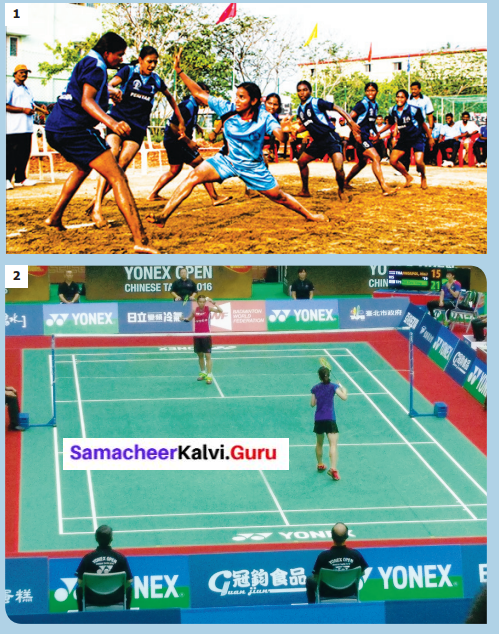

Answer:
- Kabbadi
- Badminton
- Cricket
- Relay race
Section III.
This section deals with the biography of RV. Sindhu, the Badminton player. Pusarla Venkata Sindhu is one of the two Indian badminton players to ever win a silver medal in 2017 Olympics. She is one of the top five shuttlers in the women’s singles category. She drew inspiration from the success of Pullela Gopichand, the 2001 All England Open Badminton Champion. Sindhu joined Gopicharid’s Academy and practised her training schedules earnestly. She balanced both her passion as well as her academics. Now, she holds a Bachelor’s degree in Commerce (B.Com).
P.V. Sindhu won several titles, awards and cash grants for her contribution. The Government of India has also conferred three awards on her. They are Rajiv Gandhi Khel Ratna award in 2016, Padma Shri in 2015 and Arjuna Award in 2013.
Complete the mind map given
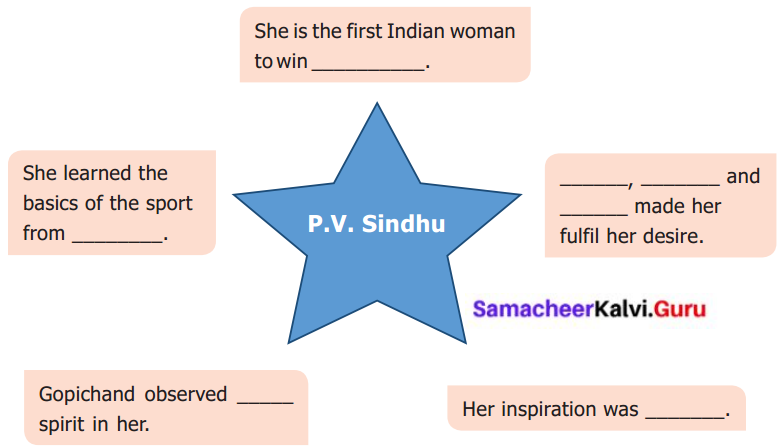
Answer:
